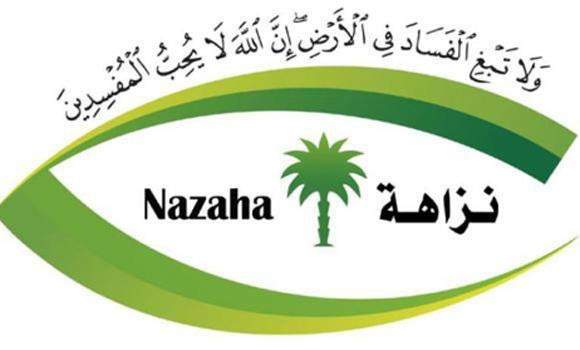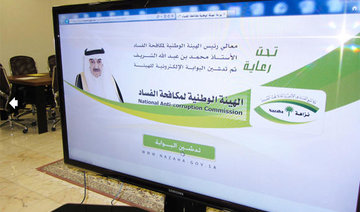RIYADH: Saudi Arabia has progressed 18 points in the control of corruption indicator 2016, which the World Bank issued last week, compared to 2015, the National Anti-Corruption Commission (Nazaha) said in a statement to Arab News on Thursday.
With this ranking, the Kingdom earned its highest percentage in controlling corruption since its entry in the World Bank indicator report in 1996.
“This came in the Worldwide Governance Indicators which the World Bank publishes every year in six different governance dimensions including: Voice and accountability; political stability and absence of violence/terrorism; government effectiveness; regulatory quality; rule of law; and control of corruption for more than 200 countries,” said the statement.
Nazaha added that this indicator includes all developed and developing countries, and it derives its information from a number of resources, surveys from research centers, and opinions of experts who work in NGOs and private companies.
The statement added that the Kingdom’s progress is a result of reforms that Saudi Arabia has recently made, and because of the efforts made by concerned entities in achieving Vision 2030, which stipulates that transparency in performance and a zero-tolerance policy on corruption in all its forms, benefit best practices, improve governance standards, activate high standards of accountability and broaden the range of services.
Saudi Arabia advances 18 points in World Bank report on corruption control
Saudi Arabia advances 18 points in World Bank report on corruption control

Kingdom arrests 19,418 illegals in one week

RIYADH: Saudi authorities arrested 19,418 people in one week for breaching residency, work and border security regulations, the Saudi Press Agency reported on Saturday.
According to an official report, a total of 11,787 people were arrested for violations of residency laws, while 4,380 were held over illegal border crossing attempts, and a further 3,251 for labor-related issues.
The report showed that among the 1,221 people arrested for trying to enter the Kingdom illegally, 56 percent were Ethiopian, 42 percent Yemeni, and 2 percent were of other nationalities.
A further 136 people were caught trying to cross into neighboring countries, and 19 were held for involvement in transporting and harboring violators, SPA reported.
The Ministry of Interior said that anyone found to be facilitating illegal entry to the Kingdom, including providing transportation and shelter, could face imprisonment for a maximum of 15 years, a fine of up to SR1 million ($260,000), as well as confiscation of vehicles and property.
Suspected violations can be reported on the toll-free number 911 in the Makkah and Riyadh regions, and 999 or 996 in other regions of the Kingdom.
Ninth Saudi relief plane for Syria lands in Damascus

RIYADH: The ninth relief plane from Saudi Arabi landed on Saturday at Damascus International Airport, state news agency SPA has reported.
The aircraft, operated by the King Salman Humanitarian Aid and Relief Center (KSrelief), was loaded with essentials supplies including food, shelter and medical supplies for the Syrian people to help them cope with the difficult conditions they are into.
This assistance is an extension of Saudi Arabia’s continuous humanitarian and relief efforts through its humanitarian arm, KSrelief, to support those in need worldwide during crises, SPA reported.
KSrelief provides food and shelter assistance in three Syrian cities

RIYADH: Saudi Arabia provided food, shelter and winter kits to the Syrian people through its aid agency, KSrelief, as part of several humanitarian missions across Syria.
The agency on Wednesday distributed bags of flour, winter kits and personal care kits to 132 families in the city of Al-Rastan in Homs, benefitting 626 individuals.
KSrelief also distributed food parcels and health kits to 1,455 families in the Afrin and Azaz regions in Aleppo, benefiting 8,730 individuals.
KSrelief on Thursday distributed 1,224 bags of flour, food baskets, personal care bags and shelter kits to 306 families in the city of Douma.
The efforts are part of Saudi Arabia’s ongoing commitment to deliver humanitarian assistance aimed at alleviating the suffering of the Syrian people.
KSrelief’s global humanitarian efforts continue

RIYADH: The King Salman Humanitarian Aid and Relief Center’s (KSrelief) humanitarian efforts continue for distressed families and individuals in need of support from basic food supplies to medical intervention.
In Sudan’s Gedaref State, Saudi Arabia’s aid agency handed out 1,117 boxes of dates to benefit 10,114 individuals displaced by the continuing conflict in the country.
In Mali’s city of Segou, KSrelief distributed 1,000 food parcels benefiting 5,600 individuals from the most vulnerable groups including internally displaced persons, widows, and people with special needs. The initiative is part of agency’s food-security support project in the country and the wider global community.
In Afghanistan’s Nangarhar Province, KSrelief turned over 276 shelter bags and 276 tents as part of the shelter project for returnees from Pakistan and those affected by the 2024 floods.
The ongoing initiative aims to distribute 4,882 various shelter materials such as tents, blankets, plastic mattresses and other basic shelter supplies in several cities in Afghanistan.
In Somalia, the national blood bank in Mogadishu – operated by KSrelief – managed to help 222 individuals in December.
In Jordan, another batch of Syrian refugees graduated from a KSrelief-run training and educational course being run at the Zaatari Refugee Camp. A total of 343 students received training on sewing, embroidery, handicrafts, culinary arts and painting. Remedial lessons were also given to elementary school students in subjects such as mathematics, Arabic and English, as well as a literacy course and Qur’anic studies.
Wild ghee production: Tradition of the Northern Borders region

- Wild ghee production peaks during the winter months due to high local demand
- Northern women showcase their ghee and other handicrafts at various festivals and national events
ARAR: In the Northern Borders region, women have long excelled in producing wild ghee, a staple rooted in the local culture and closely tied to the region’s abundant livestock, estimated by the Ministry of Environment, Water and Agriculture to exceed seven million cattle and camels.
Wild ghee production peaks during the winter months due to high local demand and is a key ingredient in many popular dishes, including porridge and festive meals.

Umm Nada, a local ghee producer, describes the multi-stage process: Starting with milking, the milk is then heated, boiled, slightly cooled and mixed with a starter culture to transform it into “khathir,” a traditional dairy product of naturally fermented or curdled milk similar to yogurt or kefir.
The mixture is then churned for more than half an hour in a goatskin or sheepskin container called a “samil.” After several days of mixing, the butter is melted over fire, turning into wild ghee, which is then stored in leather containers known as “al-nahw” or “al-dharf.”
Northern women showcase their ghee and other handicrafts at festivals and national events, with the Arar market and the Lavender Hall, which provides training and development for local producers, serving as key venues for these traditional crafts.






















